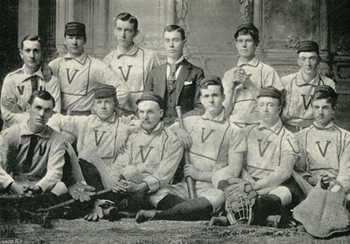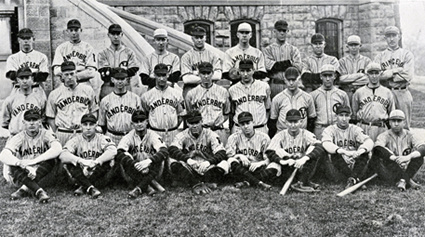May 21, 2008
![]() Vanderbilt Baseball History (pdf) | History Corner Archive
Vanderbilt Baseball History (pdf) | History Corner Archive
 |
|
| 1891 Vanderbilt Baseball Team |
Vanderbilt University was founded in 1873 with a $500.000 gift from Commodore Cornelius Vanderbilt. The university’s student body has been coeducational since 1875. The original campus which opened in a single building on 75 acres, expanded to the current 3,330 acres in 1979 when Vanderbilt merged with neighboring George Peabody College for Teachers.
The Vanderbilt University Athletic Association (V.A.A) was formed in 1886 with Dr. W. M. Baskerville serving as president. In those early days most of the Vanderbilt student body was included in the membership. The V.A.A. would oversee the sports played on the Vanderbilt campus including baseball, bicycling, tennis and track and field events.
Baseball has been a part of Vanderbilt athletics since its official debut in 1886. That two-game schedule drew a 1-1 record splitting with Vanderbilt’s first athletic rival Sewanee. Schedules were increased as the game of baseball became more popular throughout the South. A member of the 1900-01 baseball teams was Grantland Rice.
Rice was not successful in his attempt to play football, but graduated from the university in 1901. The Murfreesboro, Tenn. native became a national legend as a sports writer with his rhythmic poetic sports stories. Rice also coached Vanderbilt’s baseball team to an 11-9-2 record in 1908.
While visiting Nashville in 1911 during the off-season for his lead performance in the play “The College Widow” the great Ty Cobb was on the Vanderbilt campus to watch a football practice. Cobb would don a Commodore football uniform and practice with the team.
In 1912, the Chicago Cubs of the National League played an exhibition game on the original Dudley Field against the Nashville Vols. On that Cubs team was the famous double-play combination of [Joe] Tinker to [Johnny] Evers to [Frank] Chance. Each one of these infielders made it to the National Baseball Hall of Fame.
Tris Speaker, a member of the National Baseball Hall of Fame, clubbed a home run on Dudley Field in 1914. Speaker’s Boston Red Sox team was playing an exhibition game with the Nashville Vols of the Southern Association. Vanderbilt also hosted the Boston Red Sox in a 1921 exhibition game played at Dudley Field where the Commodores lost, 9-1.
 |
|
| 1921 Vanderbilt Baseball Team |
Vanderbilt (20-8) won the 1921 Southern Conference baseball championship behind the managing of Byrd Douglas who later became a distinguished Nashville judge. Manager Bill Schwartz (1917, 1924-40, 1952) led Vanderbilt into Southern baseball prominence in the early era of Commodore baseball. Schwartz was a former manager of the Nashville Vols. He ranks third all-time at Vanderbilt in victories with a 155-112-1 record.
The Southeastern Conference was formed in December 1932 and began competing for championships in the spring of 1933. Vanderbilt was one of the 13 charter members. Other members include Alabama, Auburn, Florida, Georgia, Georgia Tech, Kentucky, LSU, Mississippi, Mississippi State, Sewanee, Tennessee and Tulane. Sewanee would withdraw from the conference in 1940, Georgia Tech in 1964 and Tulane in 1966. Arkansas and South Carolina officially joined the conference in 1990.
The baseball program was unremarkable in the modern period until the arrival of scholarships and coach Larry Schmittou (1968-78). In 1971, the Commodores won their first of four consecutive SEC Eastern titles with a 34-19 record. In 1973 and 1974, the Commodores captured the SEC Championship and Schmittou received Coach-of-the-Year honors. He coached 20 All-SEC players while 14 were taken in the major league draft. Schmittou ranks second all-time in Vanderbilt wins with a mark of 306-252-1.
Commodore players that thrived on the diamond at this time include Rick Duncan, Mike Pike, Jeff Peeples (All-American), Mike Willis, Scotti Madison (All-American), Ted Shipley, Gene Menees, Steve Chandler, Rick Rhodes, and Scott Sanderson.
Roy Mewbourne (1979-2002) would arrive on the Vanderbilt campus to become Vanderbilt’s all-time winningest coach in a 24-year stint with a 655-608-9 record. The Commodore skipper led Vanderbilt to its third SEC crown in 1980. Mewbourne was also honored as SEC Coach-of the-Year.
Mewbourne was a catalyst in the 2002 renovation of the baseball field. Hawkins Field was unveiled as a state-of-the-art facility with over 2,000 chair back seats and new press box. The final phase of the updates were completed in 2006 with a two-story complex that includes offices, locker rooms and a weight room.
The Mewbourne era would produce such talents as All-Americans Vee Hightower, Hunter Bledsoe (1999 SEC Player-of-the-Year), Joey Cora, Boomer Whipple and Clinton Johnson. More Vanderbilt players that donned a Commodore uniform for Mewbourne were Karl Nonemaker, Jim Schifman, Josh Paul, Greg Thomas, Greg Smith, Nick Morrow, Jim Gibbs and Kyle Balch.
Tim Corbin (2003-present) has taken the baseball program into national rankings with players like Jeremy Sowers, David Price, Casey Weathers, Jensen Lewis and Pedro Alvarez. In 2004, the Commodores were two games away from their first-ever College World Series, but lost in the Super Regionals at Texas. In 2006, Vanderbilt was invited to the NCAA Tournament, but lost in the first round.
Corbin’s 2007 club was a record breaker. The club finished the season 54-13 a new victories record to go along with an SEC regular season and SEC Tournament titles. Ranked No. 1 in the country for several weeks, the Commodores hosted a NCAA regional event, but were upset by Michigan. Price was the No. 1 selection in the 2007 Major League draft.
Vanderbilt baseball players to make it to the major leagues include years at Vanderbilt: Vin Campbell (1906-08); Wilson Collins (1909-12); Doc Cook (1905-13); Harvey Hendrick (1917-22); Slim Embrey (1920-23); Andy Reese (1924-25); Mal Moss (1924-29); Mike Willis (1970-72); Scott Sanderson (1977-80); Scotti Madison (1977-80); Joey Cora (1983-85); Josh Paul (1994-96); Mark Prior (1999); Matt Kata (1997-99); Jeremy Sowers (2002-05) and Jensen Lewis (2003-05).
If you have any comments or suggestions you can contact Bill Traughber via e-mail at WLTraughber@aol.com.


